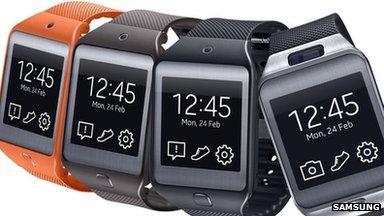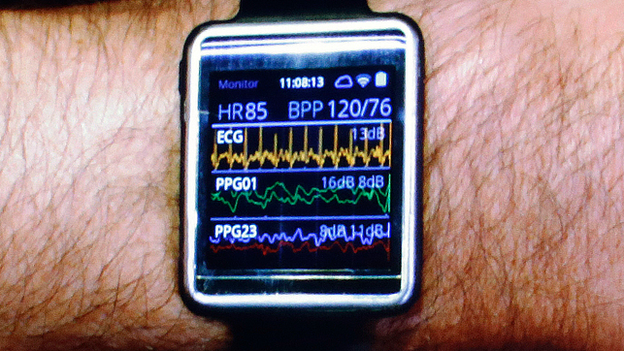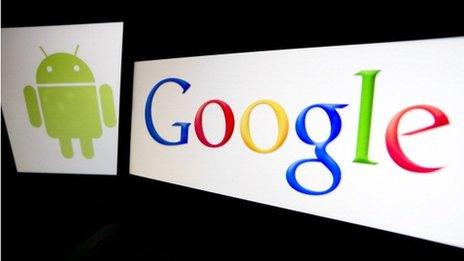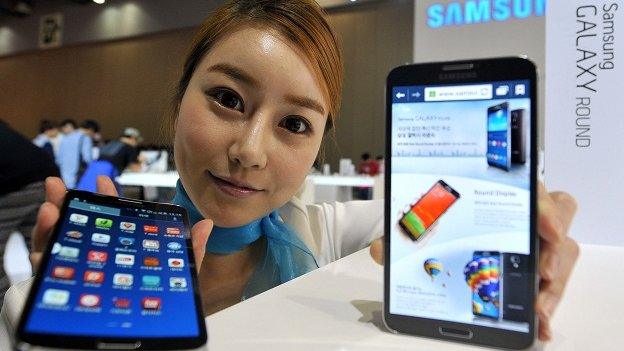Samsung launches first Tizen phone
- Published

Samsung has been developing Tizen as an alternative to Google's Android
Samsung Electronics has launched the world's first smartphone powered by the Tizen operating system.
The Samsung Z will go on sale in Russia in the July-to-September quarter.
Most Samsung phones currently use the Android platform, but the South Korean firm has been working with chipmaker Intel to develop Tizen as an alternative operating system.
It is seen as a way to make Samsung less dependent on Android's developer, Google.
"It enables Samsung to hedge its bets much better compared to some of its rivals," Andrew Milroy, a vice president with consulting firm Frost & Sullivan, told the BBC.
"However, it is unlikely to make a significant dent on the Android market share."
The company will show off the phone at the Tizen Developer Conference, being held this week in San Francisco.
It did not disclose the device's price.
Tizen Store
Samsung is currently the world's best-selling Android device manufacturer.
However, many other rivals such as HTC, Sony, LG and Huawei also use the operating system to power some of their devices.
As the competition in the smartphone sector increases, and growth rates slow, Samsung has been looking at ways to maintain its lead over rivals.
One of the areas that Samsung has been working on is Tizen - a new open source operating system for its gadgets.
"Samsung is seeking to integrate its own components, displays, software and services," said Ian Fogg from the IHS consultancy.
"Using Android makes the firm dependent on Google, meaning its ability to differentiate its products is less strong than if it had installed its own operating system.
"But by going down the Tizen route, the risk is the firm doesn't have enough high quality apps available to make the devices good enough for consumers."
Samsung has taken steps to try to encourage software creators.
It said that in order to "encourage more developers to join, the Tizen Store would provide a special promotional program to all developers for one year".
Having its own app store could help Samsung generate more revenue from app downloads.
That is because currently customers who purchase apps on Android-powered phones typically funnel revenue to Google rather than Samsung itself.
However, Mr Milroy agreed that Samsung faced a huge challenge in attracting customers to the Tizen Store.
"They have come late to the party and its going to take a long time to create an ecosystem that can rival and compete with Android, iOS or Microsoft."
Multi-platform?
Tizen is also seen by some as being attractive to app developers as it has promised to run software written in the HTML5 web language smoothly.
Mozilla's Firefox OS also relies on HTML5, offering developers the prospect of cross-platform compatibility in which they can write a single version of their app for multiple operating systems, helping cut costs and coding time.

Samsung's Gear 2 uses Tizen instead of Android
HTML5-based apps can also be made to work on Android and iOS.
But last year developers, including Google and Facebook, faced performance issues when they released products using it, and later switched to native versions.
Samsung itself delayed the launch of the first smartphones using the operating system.
However, the firm has been looking to adapt the operating system in various gadgets of late.
The latest version of its smartwatch - Galaxy Gear 2 - uses Tizen, unlike its Android-powered predecessor.
On Sunday, Samsung announced that it would release a software development kit for TVs that allows developers to build applications for Tizen-based TVs.
- Published28 May 2014

- Published10 March 2014

- Published29 October 2013
